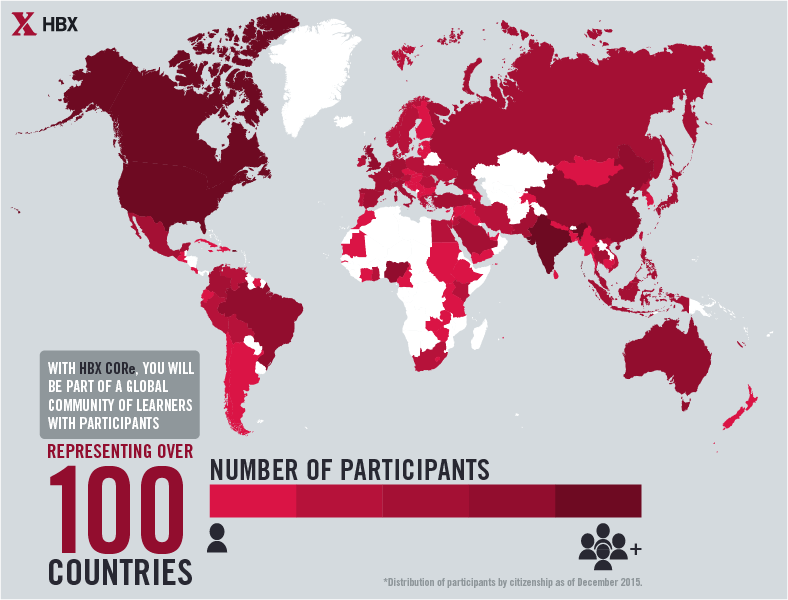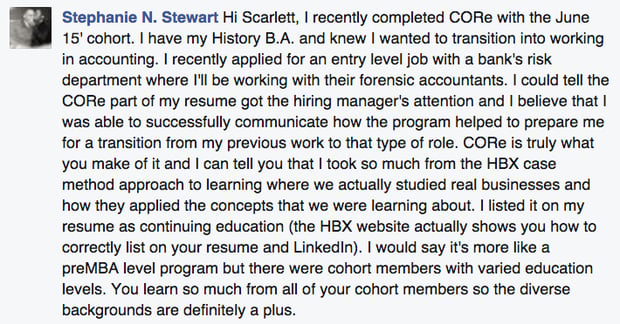
We launched our first cohort of HBX CORe in June 2014. Two years later, we checked in with a few members of our pioneer cohort to see how CORe has made a difference in their lives.
Opening Doors in the Building Industry

Akinade
I study Architecture, Construction Engineering and Management at Illinois Tech in Chicago. I also work as a design and construction intern at the Duchossois Group. CORe was instrumental in my decision to study construction management and helped me to better understand the potential roles I could play within the building industry.
A plethora of possibilities started to open up after taking the course. Previously, I had only truly imagined myself practicing the technical aspects of my education but CORe helped me see and start to work towards my place as a leader within the building and infrastructure industry.
Economics for Managers was influential in helping me understand how leadership within various industries could make strategic decisions to create value. It was incredibly fascinating to finally understand the constant balance of proactive and reactive decisions and strategies business leaders used to understand markets and as a result people.
Rounding Out Liberal Arts Educations

Jackie
CORe enabled me to become more business-focused; I always knew that I wanted to enter the business world, but coming from a liberal arts background I needed to expand upon my experience to understand what that really meant. Competing against undergraduates from business institutions can be intimidating, but understanding even basic terminology can help put your mind at ease.
CORe gave me the background and confidence to pursue a business career after college. It even helped shape an independent study that I conducted during my senior year at Bowdoin, looking at Corporate Social Responsibility Initiatives at four major banks in the United States. I do not think I would have applied this interest to corporate banks had I not had an introduction to the foundations of the business world from HBX CORe.
As I began interviewing for full-time positions during my senior year, HBX CORe definitely helped me stand out among my peers. I truly understand the value of a liberal arts education, and that is something that I would never replace. However, coming out of a liberal arts institution with some sort of an introduction to the business world is unbelievably valuable.
Since HBX CORe was still so new when I completed the program, I really caught the eye of many interviewers and companies interested in learning more about it. The knowledge that I gained helped me tremendously as I interviewed and looked into different companies to join upon graduation.
I know that CORe has set me up well for a future in the business world and I would love to pursue an MBA in the future.
Giving Engineers a Competitive Edge

Oyin
When I took HBX CORe, I was in my sophomore year of college and had begun actively thinking about my future career. I had heard of all of the great advantages of having both a science and business background but I was worried that I would struggle if I took business classes in school.
CORe really broke down all of the business concepts I had vaguely heard of and introduced new material in the clearest way with unique examples. My experience with the CORe program gave me the confidence to pursue my Business Administration minor and I plan to apply for an MBA in the future.
Having CORe listed on my resume has really helped me stand out to potential employers. Every internship interview I have had since participating in this program has involved me explaining this program and its benefits. Most employers are surprised to find an engineering student with a background in business so it usually makes me seem more impressive and gets me closer to getting through the door.
I plan to become an Industrial Engineer and explore how to improve complex systems and processes. I know that pursuing knowledge of business with my background in engineering will shape my career path in unexpected ways.
Instilling Confidence to Pursue Careers in Financial Consulting

Dan
CORe helped me solidify my knowledge of financial analysis and introduced me to the world of business analytics. Coming from a primarily non-finance background, HBX definitely provided me with the confidence needed to continue pursuing a career in financial analysis and consulting.
HBX has been discussed in every single interview I’ve had since completing the program and I’m fairly certain that the HBS brand helped me land a few of those interviews. A few times the program has been met with skepticism, but when you begin to explain how the structure of the program and the platform itself are unique compared to traditional online coursework people begin to warm up to it and ask more questions. It really boils down to it being the best online replication of a real-life classroom that I’ve ever experienced. When I reflect upon the experience, it actually feels like I was in a real classroom.
Creating Relevant Conversations with Prospective Employers

Valentina
I took CORe for an introduction into the language of business that would complement my STEM education. I was doing mostly technical classes at school, but I was interested in business as well. After the program, I realized I wanted to pursue a career in technical management and business.
I actually decided to apply for my upcoming position partly because of CORe. I got interested in Amazon after the case study about them in one of the program modules. Learning about some of the principles behind their operations motivated me to do in-depth research about the company.
The case study was part of the conversation when I first connected with recruiters during a career fair and CORe also came up during an on-site interview. I explained how the certificate would help me transition from a very technical background into a more business oriented position, and it must have worked because I got the job!
What can CORe do for you?









































